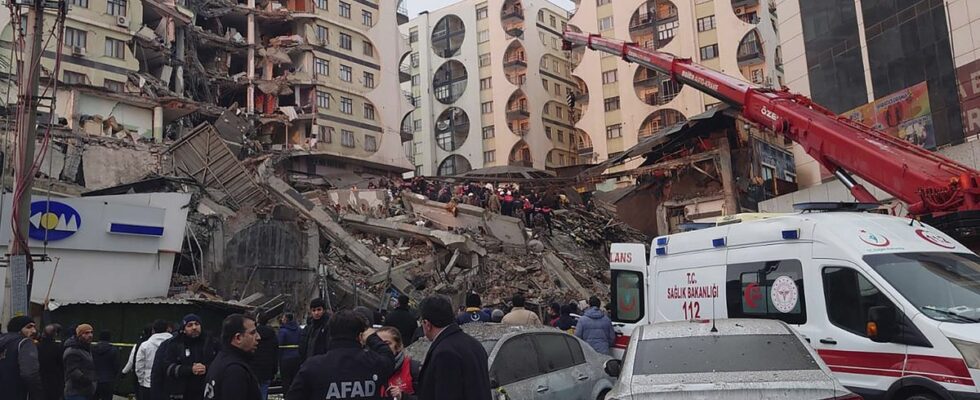During the night of Sunday to Monday, a magnitude 7.8 earthquake struck southern Turkey and northern Syria. According to the United States Geological Survey (USGS), the earthquake took place at 4:17 a.m. local time – 2:17 a.m. French time – at a depth of approximately 17.9 kilometers. The provisional toll so far reports more than 1,400 deaths in the two countries. Several countries have already sent, or offered, humanitarian aid to reinforce the local emergency services. 20 minutes provides an update on this devastating earthquake.
What is the provisional balance sheet?
The epicenter of the earthquake is located near the city of Gaziantep, in southeastern Turkey, about fifty kilometers from the Syrian border. The tremors were felt in Lebanon, Syria and Cyprus, according to AFP correspondents.
The latest Turkish provisional report dated Monday at 11 a.m. shows at least 912 dead and at least 5,385 injured, according to data communicated by Turkish President Recep Tayyip Erdogan. According to him, 2,818 buildings have collapsed, raising fears of even heavier tolls, in addition to the hundreds of deaths in neighboring Syria. For safety, the gas was cut off throughout the area due to the aftershocks and for fear of explosion. 50 aftershocks were recorded in Turkey, according to Afad.
In Syria, the quake also left many dead in government areas, the official Sana news agency reported. “The new provisional toll stands at 326 dead and 1,042 injured,” reported the Syrian deputy health minister, quoted by Sana.
In the rebel areas, there are at least “147 civilians dead and more than 340 injured according to a provisional report, in the province of Idleb and the surroundings of Aleppo”, in the north of the country, according to the White Helmets on Twitter, adding to expect a “significant increase” in the number of victims, “hundreds of families still under the rubble”.
In a statement, the White Helmets declared these regions “disaster” and called on international humanitarian organizations to “intervene quickly” to help the local population.
Where does humanitarian aid come from?
The European Union has sent rescue teams to Turkey, European Commissioner for Crisis Management Janez Lenarcic announced on Monday. “Following the earthquake this morning in Turkey, we have activated the EU Civil Protection Mechanism. The EU Emergency Response Coordination Center coordinates the deployment of European rescue teams. Teams from the Netherlands and Romania are already on their way,” the EU official tweeted. This aid responds to a request from Turkey, said a Commission spokesperson.
Germany, Italy and France have offered to help people in devastated areas, as have Belgium, Poland, Spain and Finland. Emmanuel Macron announced this morning that France was ready “to provide emergency aid to the populations”, reacting to “terrible images” of an “earthquake of unprecedented force”.
“We are following, shocked, the news of the earthquake in the border region between Turkey and Syria. The death toll continues to rise. We mourn with the families and tremble for those buried,” German Chancellor Olaf Scholz tweeted. Italy, which had issued a tsunami warning overnight, before lifting it shortly after 7 a.m., is making “available [ses personnels de] civil protection”, announced the head of Italian diplomacy Antonio Tajani.
Israel also announced on Monday that it was offering its aid to Ankara. “At the request of the Turkish government, I have ordered all authorities to immediately prepare to provide medical assistance and relief,” Israeli Prime Minister Binyamin Netanyahu said in a statement. Finally, Vladimir Putin presented his “sincere condolences” to the families of the victims and is also ready to “provide the necessary assistance” to Turkey and Syria.
Does Turkey often experience earthquakes?
Turkey, located on one of the most active seismic zones in the world, is sadly used to it. At the end of November, a magnitude 6.1 earthquake struck northwestern Turkey, injuring around 50 people and causing limited damage, according to the Turkish emergency services. In January 2020, a 6.7 magnitude earthquake struck the provinces of Elazig and Malatya, killing more than 40 people. In October of the same year, a magnitude 7 earthquake in the Aegean Sea killed 114 people and injured more than 1,000 in Turkey.
However, the intensity of this earthquake is unprecedented in more than 20 years: it is the largest affecting Turkey since the earthquake of August 17, 1999, which caused the death of 17,000 people, including a thousand in Istanbul.

